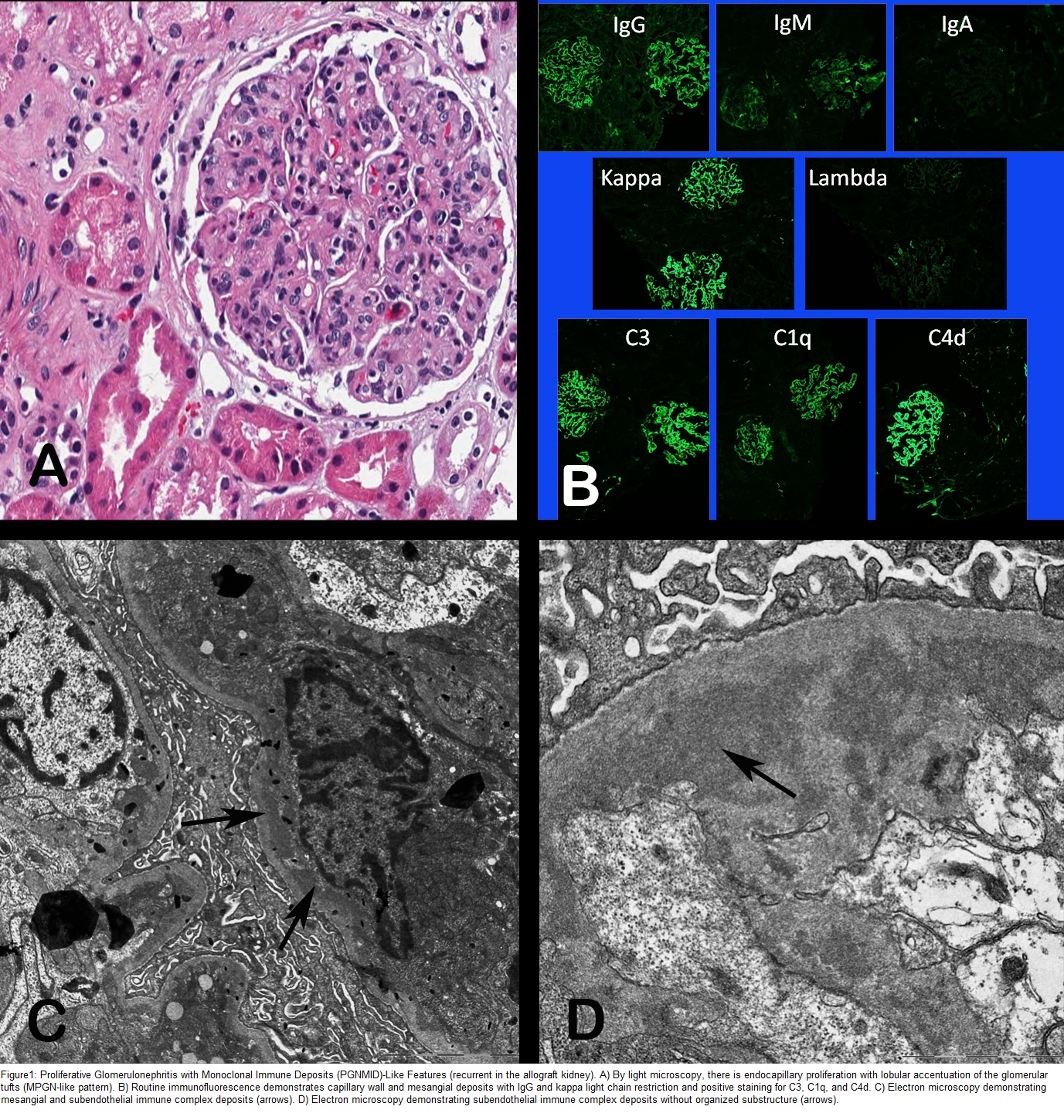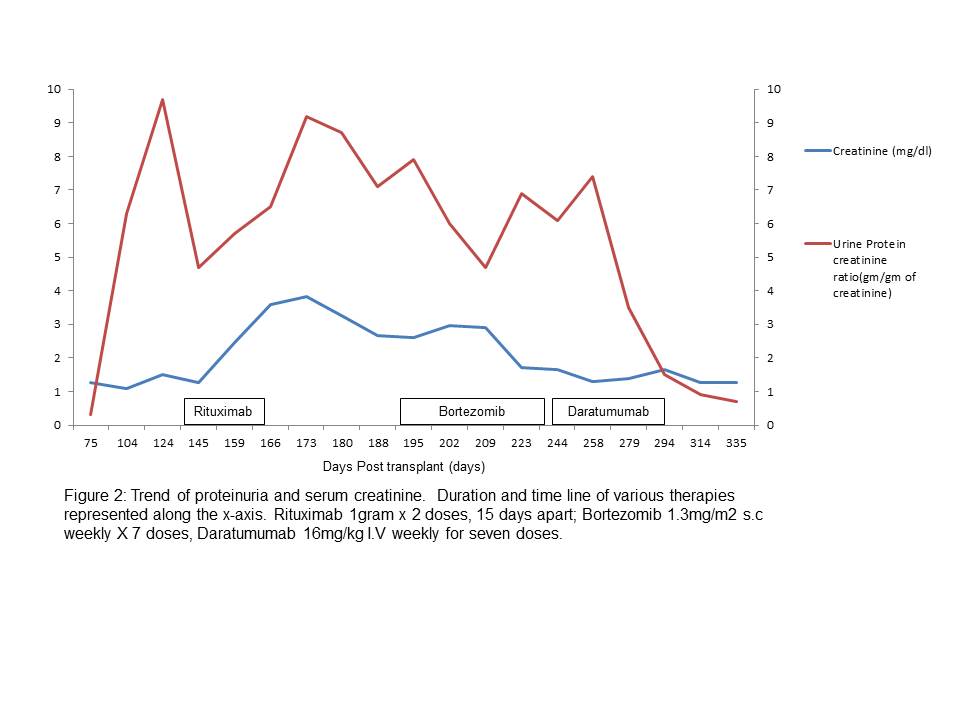Daratumumab for Severe Refractory Proliferative Glomerulonephritis with Monoclonal Immune Deposits (PGNMID).
1Intermountain Medical Center, Salt Lake City, UT
2Utah Cancer Specialists, Salt Lake City, UT
3Nephrology Assoxiates of Utah, Salt Lake CIty, UT
Meeting: 2017 American Transplant Congress
Abstract number: B169
Keywords: Glomerulonephritis, IgG, Kidney transplantation, Monoclonal antibodies
Session Information
Session Name: Poster Session B: Kidney Complications II
Session Type: Poster Session
Date: Sunday, April 30, 2017
Session Time: 6:00pm-7:00pm
 Presentation Time: 6:00pm-7:00pm
Presentation Time: 6:00pm-7:00pm
Location: Hall D1
Introduction-We report as case of refractory PGNMID treated succesfully with anti-CD38 antibody (Daratumumab). Case report-65 year old male with ESRD attributed to to post infectious MPGN, MGUS underwent LRKT. Six months post-transplant, patient developed proteinuria (9.7gm/d), AKI (creat 1.51). SPEP showed and unchanged monoclonal spike, <3.0g/dl (IgG lambda and IgG kappa) ; DSA and serology were negative. Biopsy showed PGNMID with IgG(IgG3) and kappa light chain restriction and positive staining for C3, C1q, and C4d. We started 60 mg of prednisone and two doses of rituximab (1gm/dose) 15 days apart. A bone marrow biopsy showed plasma cell clone less than 1%, consistent with MGUS. There was no significant change when compared to bone marrow biopsy prior to kidney transplant. The monoclonal plamsa cells expressed CD38, CD45. Absent response, we started Dexamethasone, Bortezomib (1.3mg/m2) s.c weekly for seven doses, one month after last dose of rituximab. Proteinuria persisted, and we decided to initiate Daratumumab (16 mg/kg) weekly for total of seven doses to target CD38 positive plasma cell clones in bone marrow.
We started 60 mg of prednisone and two doses of rituximab (1gm/dose) 15 days apart. A bone marrow biopsy showed plasma cell clone less than 1%, consistent with MGUS. There was no significant change when compared to bone marrow biopsy prior to kidney transplant. The monoclonal plamsa cells expressed CD38, CD45. Absent response, we started Dexamethasone, Bortezomib (1.3mg/m2) s.c weekly for seven doses, one month after last dose of rituximab. Proteinuria persisted, and we decided to initiate Daratumumab (16 mg/kg) weekly for total of seven doses to target CD38 positive plasma cell clones in bone marrow.  With Daratumumab therapy, proteinuria decreased to 0.7 gms. We maintained tacrolimus and prednisone. Discussion- We report for the first time the use of Daratumumab for targeted ablation of plasma cell clones (CD38+) in severe, refractory PGNMID. Our report delineates a novel approach to targeted depletion of plasma cell clones rather than broad based approaches currently extant . Daratumumab, monoclonal anti-CD38, offers a novel treatment that could be used for plasma cell mediated renal disorders such as MGRS and chronic AMR.
With Daratumumab therapy, proteinuria decreased to 0.7 gms. We maintained tacrolimus and prednisone. Discussion- We report for the first time the use of Daratumumab for targeted ablation of plasma cell clones (CD38+) in severe, refractory PGNMID. Our report delineates a novel approach to targeted depletion of plasma cell clones rather than broad based approaches currently extant . Daratumumab, monoclonal anti-CD38, offers a novel treatment that could be used for plasma cell mediated renal disorders such as MGRS and chronic AMR.
CITATION INFORMATION: Anand S, Miller D, Chipman G, Morris D, Srinivas T. Daratumumab for Severe Refractory Proliferative Glomerulonephritis with Monoclonal Immune Deposits (PGNMID). Am J Transplant. 2017;17 (suppl 3).
To cite this abstract in AMA style:
Anand S, Miller D, Chipman G, Morris D, Srinivas T. Daratumumab for Severe Refractory Proliferative Glomerulonephritis with Monoclonal Immune Deposits (PGNMID). [abstract]. Am J Transplant. 2017; 17 (suppl 3). https://atcmeetingabstracts.com/abstract/daratumumab-for-severe-refractory-proliferative-glomerulonephritis-with-monoclonal-immune-deposits-pgnmid/. Accessed February 16, 2026.« Back to 2017 American Transplant Congress
